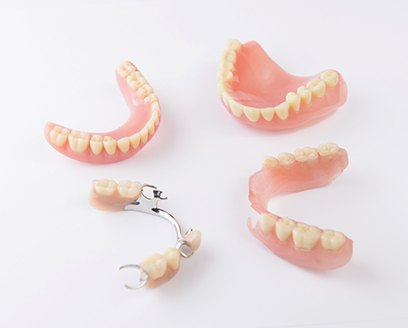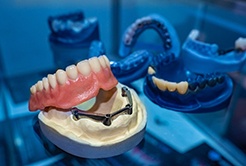
Dentures – Fort Worth, TX
Quickly Restore Your Confident, Complete Smile!
If you’re missing several teeth or an entire arch, we don’t have to tell you how problematic gaps in your smile can be. An incomplete set of pearly whites can make it difficult to smile confidently, chew and speak comfortably, and fully enjoy some of your favorite things in life. Thankfully, at Studio Dental of Chisholm Trail, we offer several tooth replacement options, including dentures in Fort Worth! Schedule your consultation today to see if this reliable restoration can help you quickly restore your confident, complete smile!

Why Choose Studio Dental of Chisholm Trail for Dentures?
- High Quality Materials for Lifelike, Long-Lasting Results
- Compassionate Dentist with Years of Experience
- Financing & Savings Plan Available for Affordable Care
Types of Dentures

Did you know there are several different types of dentures? During your consultation, your Fort Worth dentist Dr. Anil Patel will inspect your mouth, bite, and jaw to help you determine which type of tooth replacement solution is best for you. Each one is custom-made from high-quality materials for beautifully lifelike results that last.
Partial Dentures
Partial dentures are a great choice for those who are missing several teeth in a row. They’re designed to fit precisely around and between your remaining teeth to seamlessly fill in the gaps, much like a puzzle piece. Small metal clasps wrap around your natural tooth structure to securely hold your new teeth in place.
Full Dentures
When you think of dentures, the image of full dentures is likely what comes to mind. Natural-looking ceramic teeth are set into an acrylic, gum-colored base to replicate a full arch of beautiful pearly whites. Thanks to their close fit, full dentures use natural suction to sit comfortably and firmly on your gums while you chew, speak, and laugh.
Implant Dentures
If you’re looking to maximize the function, comfort, and lifespan of your new smile, implant dentures may be for you. While rebuilding your smile with a denture that’s held in place with several dental implants may take more time and effort than traditional means, they offer a vastly improved biting force and unmatched stability.
Am I a Good Candidate for Dentures?

Full and partial dentures are a great way for nearly anyone to replace missing teeth. During your consultation, Dr. Patel will review your oral health to see if there are any issues such as cavities or gum disease that need to be addressed first. If you’re interested in implant dentures, you’ll need to be in good overall health and have adequate jawbone density as well. Dr. Patel will take the time to fully explain all your tooth replacement options, answer your questions, and help you choose the best method for regaining your complete smile.
What Are the Benefits of Dentures?

When you choose to replace your missing teeth with dentures, you can enjoy benefits such as:
- Improved ability to speak clearly and chew easily.
- Filled-out facial appearance and more youthful look.
- Easy treatment with fast, beautiful results.
- Non-invasive solution for missing teeth.
- An affordable option for restoring your smile.
Remember, missing teeth can eventually lead to serious oral health concerns. If you’re interested in dentures, don’t hesitate to give us a call today!
Dentures Aftercare

Taking good care of your dentures is crucial for ensuring their longevity and functionality. At Studio Dental of Chisholm Trail, we've put together some easy tips to help keep your dentures comfortable, functional, and strong. We'll teach you how to clean them properly and take good care of your mouth. With the right aftercare, you can maximize the benefits of your dentures for years to come!
Removable Dentures

Remove After Eating
Keep your dentures clean by taking them out and rinsing them after each meal. This practice helps prevent the buildup of food particles and plaque. Be sure to use lukewarm water, as hot water can distort the denture material and affect the fit.
Clean Your Restoration
To clean your dentures well, take them out of your mouth. Use a soft-bristled toothbrush and a little unscented hand soap, mild dish soap, or denture cleaner to gently brush them.
Avoid using regular toothpaste since it can be rough and harm your dentures. If you're not putting them back in right away, keep them in water or a denture-cleaning solution to stop them from drying out and changing shape. Before putting them back in your mouth, rinse them well to get rid of any cleaning stuff.
Keep Your Dentures Safe
To be safe while cleaning your dentures, place a towel underneath them in case they accidentally slip from your hands. This extra precaution can help lower the risk of damaging them. Also, make sure to keep your dentures out of reach of small children and pets to keep them safe and prevent any accidents.
Remove When You Sleep
Get into the habit of taking out your dentures before bedtime. Wearing them for extended periods can affect gum circulation, leading to potential irritation of the soft tissues. Sleeping with dentures has been associated with higher risks of pneumonia and increased plaque on the gums and tongue. Prioritize your oral health by allowing your gums and dentures to have a restful night's sleep.
Notice Changes
Pay attention to any shifts in your oral health, such as mouth sores, gum irritation, or signs of infection. If you spot any problems, inform us right away so we can take care of them quickly. Likewise, if you feel your dentures are moving, clicking, or not fitting well, don't hesitate to reach out. They might need adjustments or even replacement to guarantee they're as comfortable and functional as possible.
All-on-4 Dentures

If you have All-on-4 dentures, keeping them clean is incredibly important. Brush them twice a day using a soft-bristled manual or electric toothbrush and a gentle toothpaste without baking soda or stain-removing agents.
Don't forget to floss between your replacement teeth daily, using floss threaders to get under the denture. A water flosser can also be really helpful for keeping your restoration and implants clean. Consider using narrow sulcus brushes to effectively clean between your restoration and gums. It's also a good idea to include a daily rinse with antibacterial mouthwash to prevent tartar buildup.
Denture FAQs

If you’re missing several, most of, or all of your pearly whites, then you probably know how life-changing dentures can be for you. With these restorations, you’ll be able to regain your ability to eat comfortably, speak clearly, and smile confidently. However, it’s natural to want to know more about the treatment before beginning the process. That’s why our team has taken the time to collect and answer the most common questions we get from our patients. Read on or give us a call today if you wish to learn more about dentures in Fort Worth!
Is It Hard to Speak with Dentures?
Once you first start wearing your dentures, it’ll take some time to get used to how they work in your mouth. This also means you’ll have to learn how to speak with them on, as your tongue will need to get accustomed to the presence of your new teeth. While the amount of time necessary to speak with dentures can vary from each patient, practice will be the defining factor for your adjustment process. Make sure to pronounce words and sounds repeatedly, especially those that are more difficult for you. Try reading out loud and conversing with friends or family members, and you should speak more clearly over time.
Can You Still Eat Steak with Dentures?
Have you been waiting to munch on a juicy steak? While tough meats can be difficult to chew with dentures, it isn’t impossible if you practice the right precautions. Try sticking to tenderloin or other cuts of beef that won’t have as many muscle fibers or connective tissues. These can make your steak tougher to chew. Once the meat is thoroughly tenderized, make sure to cut it into tiny pieces before enjoying them. The smaller the parts, the easier it’ll be for you to enjoy your meal with your dentures on.
Will It Hurt to Get Dentures?
If you require tooth extractions before receiving your dentures, then you’re more likely to experience some mild discomfort after your procedure. Fortunately, this can easily be managed by taking over-the-counter or prescribed pain relievers as needed. Once you get your dentures for the first time, you might expect minor irritation as your mouth grows accustomed to them. Switching to a new set may take an even longer time to get used to, but this will vary from patient to patient. While mild discomfort is natural, you should give us a call right away if any pain persists or worsens. We’ll be able to assess your situation and make any adjustments so that your dentures fit properly on your smile.
Can I Sleep with My Dentures On?
Although it’s possible to sleep with your dentures on, we highly recommend that you take them off before going to bed. When first getting your restorations, you’ll need to wear them for 24 hours straight. Afterward, you should remove them every evening. Since wearing your dentures restricts circulation in your gums, it can result in soft tissue irritation and even speed up ridge resorption. By taking them off overnight, you’ll give your gums a chance to recover and receive the necessary nutrients. Additionally, bacteria can accumulate between your gumline and the underside of your dentures. If you sleep with your restorations on, you can end up increasing your risk of pneumonia. To avoid this, simply remove and soak them overnight to preserve good oral and overall health!